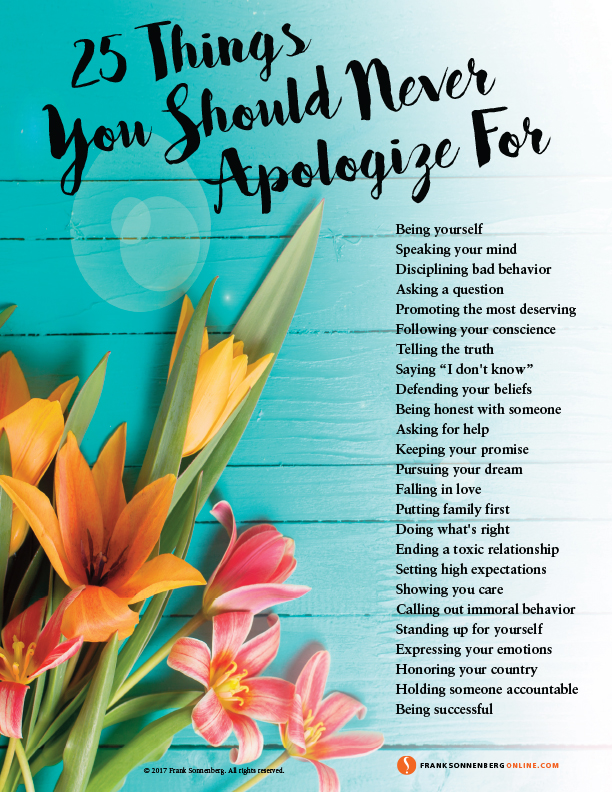
If You Offend Someone, Should You Apologize? (Not Always.)
Never apologize for:
- Being yourself
- Speaking your mind
- Disciplining bad behavior
- Asking a question
- Promoting the most deserving
- Following your conscience
- Telling the truth
- Saying “I don’t know”
- Defending your beliefs
- Being honest with someone
- Asking for help
- Keeping your promise
- Pursuing your dream
- Falling in love
- Putting family first
- Doing what’s right
- Ending a toxic relationship
- Setting high expectations
- Showing you care
- Calling out immoral behavior
- Standing up for yourself
- Expressing your emotions
- Honoring your country
- Holding someone accountable
- Being successful
I’m Not Sorry. Are You?
Please leave a comment and tell us what you think or share it with someone who can benefit from the information.
Additional Reading:
50 Things Your Conscience May Be Trying to Tell You
14 Things You Can’t Afford to Take for Granted
17 Action Steps to Take During Tough Times
42 Ways to Make Your Life Easier
If you like this article, subscribe to our blog so that you don’t miss a single post. Get future posts by RSS feed, email or Facebook. It’s FREE.





Regarding (7) and (10) in this post, I really have to qualify those. “Be honest” and “tell the truth”, absolutely. Unfortunately, too many people seem to equate “honesty” and “truth” with “license to be an asshole”. Yes, honesty is, as your mama told you, the best policy. Honesty and truth telling at the expense of tact or empathy, or with an aim to just be nasty with no regard to the other person’s feelings, is not. There’s always a way to be honest without being a jerk. Always.
Hi Buddy
I think everyone with class would agree with you 🙂
Best,
Frank
Totally agree with you. I remember a saying in Indian culture wherein they say
1. Speak truth 2. Speak lovingly and most importantly 3. Speak truth in a palatable way
Well said, Sri. Have a a wonderful day!
Best,
Frank
Frank love it as always. Especially in light of the fact that we are living in a society where we must seemingly apologize whenever we make others uncomfortable. I do think the one about “expressing emotions” needs some nuancing. Losing one’s temper is an example of expressing one’s emotions. Allowing the negative emotions we all have to become behaviors usually if not always require an apology. On the other hand I do know what you mean here. And I agree with that as well. Well done on another great one!
Hi Augie
I can see how you got, “losing one’s temper” from “expressing one’s emotions.” I wholeheartedly agree with you. What I was trying to say is that people have the right to cry without feeling ashamed or criticized for doing so.
Thanks for taking the time to write.
Best,
Frank
Sadly, so many of these mean that you WILL be chastised (or even worse – threatened) these days as so many people and so many organizations contrast your honestly held – not necessarily even loudly proclaimed – beliefs with their narrowly focused stands. The tolerance of alternative viewpoints is so minimal approaching zero!!!
My concern beyond my safety is the impact my views on caustic treatment of me in general and trashing of my views on unrelated topics … To this point, I’ve continued to share calmly all my views. But I’m concerned … Not so much for myself, those there is some concern, but for our country and the world …
Hi John
We live in a world that’s getting smaller every day. We can’t expect others to abandon their values any more than we would forsake our own. It’s important to be tolerant of other people’s cultures and values, recognizing that no one has the right to force his or her way of life on anyone else.
Some people are so closed-minded that their behavior is not only ugly, it’s destructive. They bully and ridicule others, hoping to convert them to their way of thinking. The truth is, everyone is entitled to an opinion. No one, however, is entitled to force their opinion on others. Doing so is the surest way to end not only a conversation but a relationship as well. That doesn’t mean you have to compromise your principles, but it’s important to respect the right of others to believe as they see fit.
Debate encourages people to challenge viewpoints in a safe and open environment. This back-and-forth exchange exposes the strengths and weaknesses of an argument and emboldens everyone to either build on its merits or discard it. It also facilitates the understanding of opposing viewpoints and challenges everyone to consider various sides of an issue.
The fact is, you don’t win a debate by suppressing discussion; you win it with a better argument.
I long for a day when leaders bring us together rather than divide us; when people strive to better themselves rather than trying to change others; when fairness and tolerance replace weapons disguised as words; when we measure success not by what people accumulate in life, but by what they’re able to give back.
Thanks for taking the time to write.
Best,
Frank